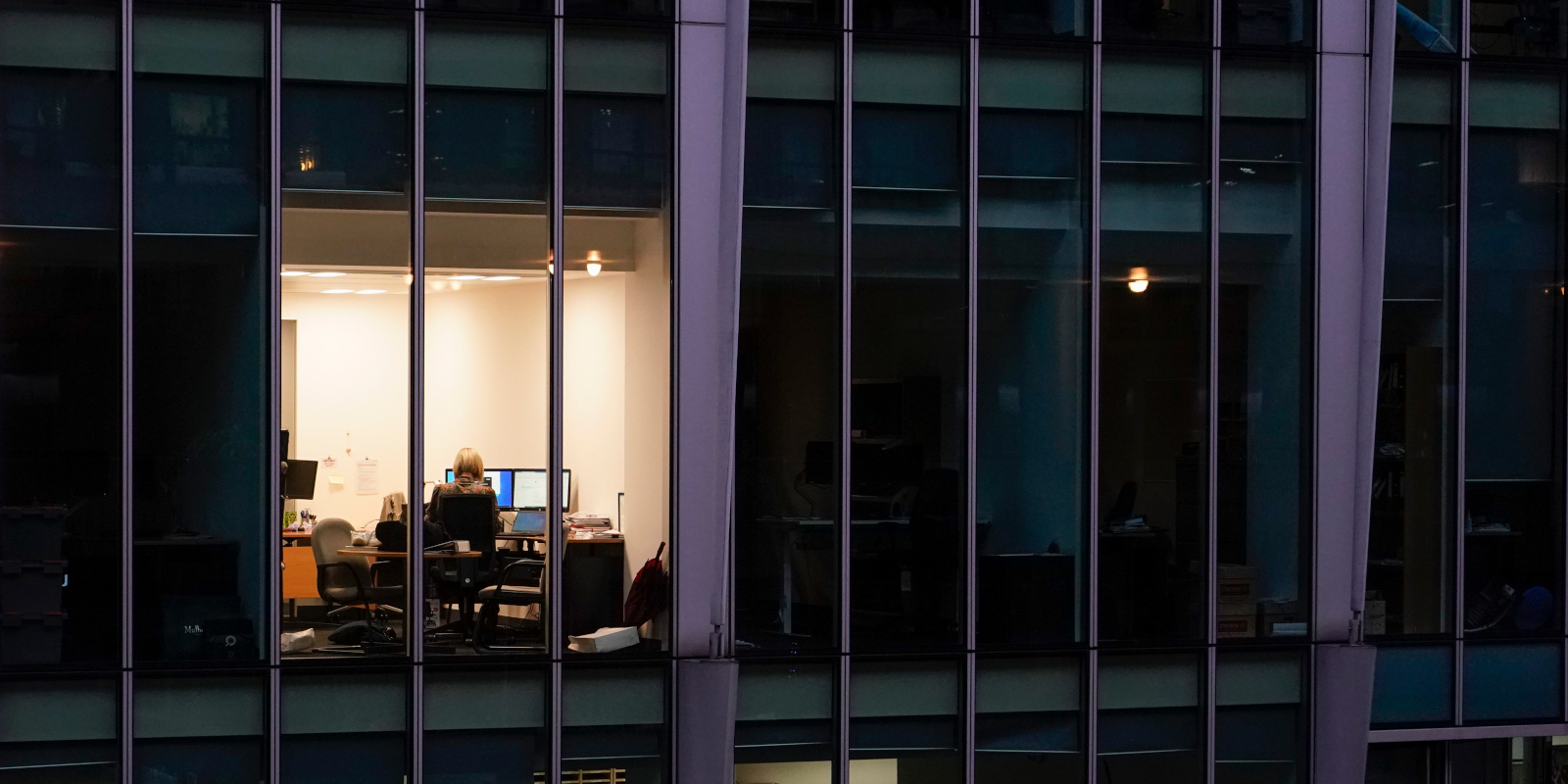Here at The Hub we are convinced that delays in getting back to the office and now the rise of so-called “quiet quitting” risk having significant consequences for individual Canadians, the economy, and our broader society that need to be better understood and debated.
We recently ran an editorial that made the case for getting back to the office, but we don’t want to have the last word on the subject. We put out the call for Hub readers to respond with their own experiences and are delighted to share the latest sample of comments and feedback. We will continue to update this story with your feedback as it comes in.
If you would like to tell us about your own empty office experience or contribute to this discussion, please email us at editorial@thehub.ca or contact us anonymously via our online submission form.
Houston, we have a problem
Having worked in a branch of government where we were required to be at work throughout the pandemic, I have been appalled at the lack of candour and honesty about the impact on productivity, creativity, (the list goes on) within government. An honest retrospective analysis is one thing, but as the nation considers the lessons from the pandemic, from the Afghanistan withdrawal, to how we have responded to Russia’s invasion of Ukraine…
In order to learn, adapt and adjust, I can’t help but think that there is a connection between work from home and the paucity of dialogue, of ideas, of innovation, or, even more fundamentally, an acknowledgment that we have a problem.
There’s no replacing in-person communication
Dear The Hub, I am an IT Project Manager and getting people back into the office is a real challenge. My organization has adopted a hybrid model of working only one day a week in the office. While our work can be done effectively with online collaboration tools, I strongly believe there is no replacement for interpersonal communications face to face.
The challenge is the competitive job market. If we apply any return to work pressure on our staff they can simply leave for somewhere that will let them work from home. We have had five people cycle through our team in the last nine months, which is devastating when it takes three months to get a new team member up to speed on our systems and projects. Additionally, when a team member gets COVID, it spikes team members’ fears and causes them to abstain from even the one-day-a-week in the office that is our current policy.
I feel like the way we work has shifted and is not going to return to the status quo. For us, in the technical space, this is not an issue but the impacts in other industries and especially the service sector could have real long-term effects on hiring and quality of service.
Why should we return to an antiquated, inefficient model?
I am a manager fighting to defend the increase in efficiency, effectiveness, and satisfaction that I and my team have gained over the past two years working from home versus in the office.
I am a professional engineer with over thirty years of experience, currently working as a manager in the public service within the much-maligned Department of National Defence’s (DND) equipment procurement section. Prior to joining the public service, I spent over a decade in industry, working in everything from well-established industrial companies that went bankrupt, to start-ups (remember the dot-com era) that also went bankrupt. I have experienced both sides of the business spectrum.
The DND, operating as a defacto multi-national entity, has a very sophisticated and reliable internal network that works globally by design. I am paid for my knowledge and experience to solve problems, define requirements, initiate and execute equipment procurements and yes, actually deliver equipment on time, under budget, and to specification. My team and I work remotely by definition. The equipment we manage is located thousands of kilometres away at bases around the country and deployed globally. The manufacturers and repair facilities are global. We are in a tall multi-story office building outside the downtown Ottawa core. None of our deputy ministers, or assistant deputy ministers, or the folks from other government departments we have to deal with to accomplish our tasks (like Public Services and Procurement Canada), are in the same neighbourhood.
For the same reason as churches now stand empty, so too should office buildings for some that are edifices to an inefficient and ineffective past. To have a meeting with another government department, we would have to take a taxi across the river. We could take a taxi until the uproar over public servants taking cabs resulted in us having to take infrequent shuttle buses wasting even more time. Simple monthly progress meetings with vendors under contract entailed significant travel expenditures and loss of office time, not to mention the overhead costs associated with processing all those taxi chits and travel claims.
To preserve a corporate culture you have to have one first. I have no idea what the public service corporate culture is anymore, even before the pandemic hit. My team and I work very hard (we all came from the private sector), particularly so compared to our public service brethren. I have as much meaningful contact with my team as before the pandemic. I have successfully hired and integrated new members from outside the public service. I recently lost a very talented team member back to the private sector on the promise of better, pay, benefits, and most importantly of all, working conditions—work from home. We actually succeed in delivering much-needed equipment despite the senior management we are saddled with, and the government policies and directives that constrain anyone in the public service from being pragmatic.
We do not miss the wasted time and cost of the daily commute—and I am ten minutes from the office. We do not miss the distractions of constantly being interrupted by non-work social chatter. We do not miss the continued and demoralizing reminder of how many slackers there are in our division by virtue of their presence in the lunch room watching TV or chatting with others seemingly all day long. In short, we are happy to be left alone to work in our small group, accountable for delivering on the mandate we have been given.
My team’s demographic spans the newly-wed to the nearly-dead and everything in between. For those caring for convalescing elderly parents, remote work has been a boon given the lack of care capacity within Canada. For those with school-age kids who are perennially sick and need care at home, remote work allows a reduction in leave increasing productivity to a segment that is very time challenged.
I am not an advocate of doing away with the office building as a centre of gravity for work. I am not an advocate of letting everyone work scattered to the four corners. Working remotely should be a privilege, not a right. It should be earned by demonstrating that one has a home setup that is formal, productive, and free of distraction. To work remotely is to be available, engaged, and producing in sync with the rest of the team. It is not to permit working at all hours, from anywhere, when the spirit moves one so. I do not accept “my computer isn’t working today” excuses to cover up a lack of work output. My response is then, “Go to the office, the connections work there and the IT folks will sort you out.”
I fully support the need to be in an office of proportionate size for specific tasks and functions. Some group meetings which require creative interaction cannot be done as effectively online, particularly when the building infrastructure is so lacking that one resorts to an iPhone on a table. There should be space and services available for those who do prefer to work in the office for whatever reason.
But to carry the overhead of 100 percent capacity when even pre-pandemic it was never a reality (due to travel, remote meetings, sickness, vacation, etc.) is inefficient and not a good use of resources. I for one would be happy to negotiate a pay decrease commensurate with the costs of commuting and working in the office, to permanently work from home if I could. But I have no choice in this matter—we are all unionized whether we like it or not—and there is no way the public sector unions will negotiate that.
I personally used to enjoy and appreciate The Hub up until your Roundtable last Friday (02 Sep) and the editorial that accompanied this invitation. Your sweeping condemnation of all public servants, and now entering into an editorial advocating a near-religious worship of an antiquated and inefficient form of one type of work has me reconsidering my subscription and recommendation of The Hub to others now. [Editor’s note: We hope you stick around!] I hope you stay the course and stick to an exploration of ideas—there are lots to examine, from how big the public sector should be, to why public servants should have good pensions (because I don’t have the freedom to invest my retirement savings in the companies I work with who have contracts I manage?), to what the public sector should and should not do, or to why, in my particular field, defence procurement is so broken.
Signed, An unappreciated, hard-working engineer in the public service.
Recommended for You

Rudyard Griffiths: Mark Carney should pay attention to Canadian bonds. Trouble is brewing at the long end of the curve.

‘We are not the United States. No one needs to own Canadian bonds’: Rudyard Griffiths and Sean Speer on Canada’s looming debt crisis

DeepDive: Bridging the imagination gap: Why Canadian businesses must rethink AI adoption now

Ginny Roth and Brian Dijkema: Why Ontario should allow independent schools and unlock true choice in education



